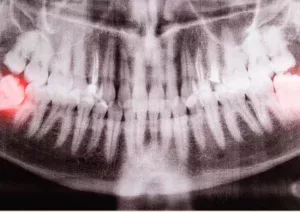Jaw ache can be a real pain (literally!), and there are many potential culprits. One common cause, particularly for young adults in the UK, is wisdom teeth. If you’re experiencing jaw discomfort and suspect those pesky third molars might be to blame, you’ve come to the right place.
Why Do Wisdom Teeth Cause Jaw Pain in the First Place?
Before we dive into the specifics of jaw ache, let’s quickly recap what wisdom teeth are and why they cause so many problems. Wisdom teeth, or third molars, are the last teeth to develop in your mouth, usually emerging between the ages of 17 and 25. While some people have no issues with theirs, many experience problems due to:
- Impaction: They can often become impacted, meaning they don’t have enough space to erupt properly. They can get stuck beneath the gums, grow at an angle, or only partially emerge.
- Crowding: Even if they erupt, they can crowd existing teeth, putting pressure on the jaw and causing misalignment.
- Infection: Impacted wisdom teeth can create pockets where bacteria can thrive, leading to pericoronitis (inflammation of the gum tissue) or even more serious infections.
These issues can all contribute to jaw pain, ranging from a dull ache to sharp, throbbing sensations.

Different Types of Jaw Pain
Jaw pain related to wisdom teeth can manifest in various ways. Here are some common types of jaw ache you might experience:
- Constant, dull ache: This is often a sign of pressure from an impacted tooth pushing on surrounding teeth and jawbone.
- Sharp, shooting pain: This type of pain can occur when the tooth partially erupts and irritates the gums or cheek.
- Pain when opening your mouth or chewing: Difficulty and pain when trying to open your mouth wide or chew your food can indicate that the tooth is interfering with your jaw’s normal movement.
- Referred pain: Sometimes, the pain originates from your tooth but is felt in other areas, such as your ear, temple, or neck.
It’s important to pay attention to the specific characteristics of your jaw pain, as this can help your dentist determine the underlying cause and recommend appropriate treatment.
When to See an NHS Dentist or Private Dentist for Wisdom Tooth Pain
While occasional mild discomfort is normal, certain signs indicate that you should seek professional help from an NHS or private dentist:
- Severe or persistent pain: If your jaw ache is intense, doesn’t improve with over-the-counter pain relief, or lasts for more than a few days, it’s time to see a dentist.
- Signs of infection: Be on the lookout for redness, swelling, pus, bad breath, a bad taste in your mouth, fever, or difficulty swallowing. These are signs of infection that require prompt attention.
- Limited jaw movement: If you’re struggling to open your mouth fully, this could be a sign of a serious problem and warrants immediate dental evaluation.
- Swelling in your face or jaw: Facial swelling can indicate a spreading infection and requires urgent care.
In the UK, you can access dental care through the NHS or private practices. If you’re experiencing severe pain or signs of infection, seek emergency dental care, which is available through both NHS and private providers.
Removal Cost & Treatment Options Explained
If your dentist determines that your wisdom teeth are the source of your jaw ache, they’ll likely recommend extraction. Here’s what you can expect:
- Extraction procedure: The procedure typically involves numbing the area with local anaesthetic and then carefully removing the tooth. In some cases, a surgical approach may be necessary, especially for impacted teeth.
- Removal cost: The cost of an extraction in the UK varies depending on several factors, including the complexity of the extraction, the type of anaesthesia used, and whether you opt for NHS or private treatment. NHS treatment is generally more affordable, but waiting lists can be long. Private treatment offers more flexibility and shorter waiting times, but it comes at a higher cost.
- Pain management: Your dentist will prescribe pain medication to help manage any discomfort after the extraction. They may also recommend over-the-counter pain relievers, ice packs, and a soft food diet.
- Alternatives to extraction: In rare cases, if they are not causing significant problems and are unlikely to do so in the future, your dentist may suggest monitoring them instead of extraction.
Tips for Maintaining Good Oral Health
While you can’t always prevent problems, maintaining good oral hygiene can reduce your risk of complications:
- Brush and floss regularly: Brush your teeth twice a day with fluoride toothpaste and floss daily to remove plaque and food particles.
- Regular dental check-ups: Visit your dentist for regular check-ups and cleanings, as recommended. This allows your dentist to monitor the development of your wisdom teeth and identify any potential issues early on.
- Consider early removal: In some cases, dentists may recommend proactive removal of wisdom teeth before they cause problems, especially if they are impacted or likely to cause crowding.

Caring for Your Jaw and Ensuring a Smooth Recovery
After having your wisdom teeth removed, it’s crucial to follow your dentist’s post-operative instructions carefully to promote healing and prevent complications:
- Rest: Take it easy for the first 24 hours after the extraction. Avoid strenuous activity and get plenty of rest.
- Manage swelling and pain: Apply ice packs to your jaw to reduce swelling and take prescribed pain medication as needed.
- Eat soft foods: Stick to a soft food diet for the first few days, gradually introducing more solid foods as you heal.
- Maintain good oral hygiene: Gently brush your teeth and rinse with salt water as directed by your dentist.
- Attend follow-up appointments: Keep your follow-up appointments with your dentist to ensure proper healing and address any concerns.
By following these tips, you can minimise discomfort and ensure a smooth recovery after wisdom tooth removal.
Remember: This blog post provides general information about wisdom teeth and jaw aches. It is not a substitute for professional dental advice. If you’re experiencing jaw pain or have concerns about your wisdom teeth, consult a qualified dentist for a proper diagnosis and treatment plan. Get in touch with our experts at Waldron Dental for further advice.













